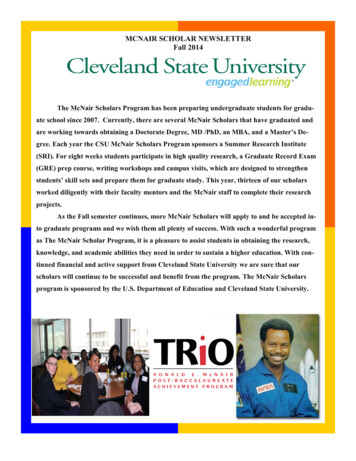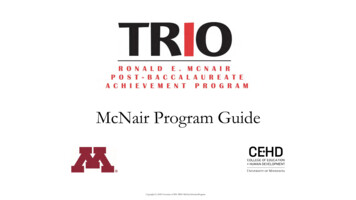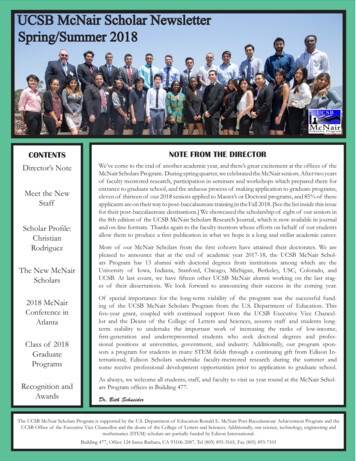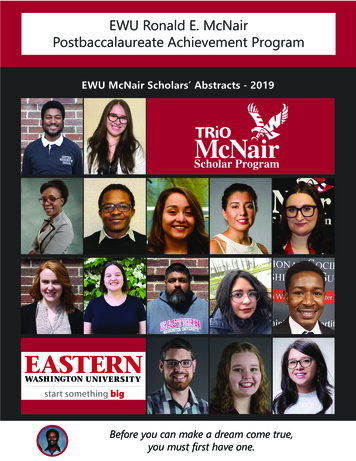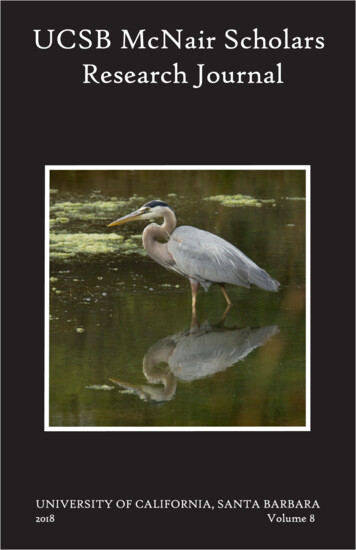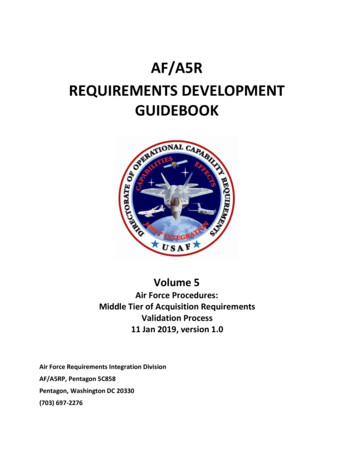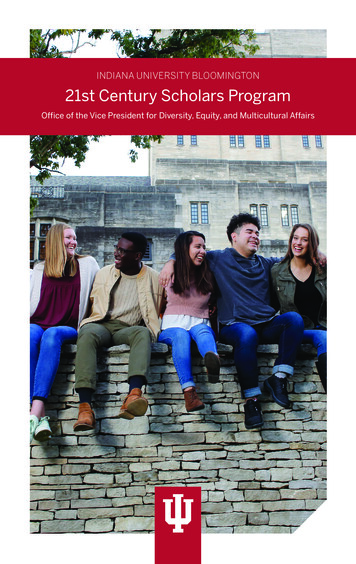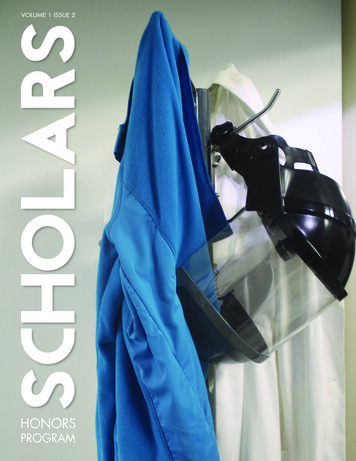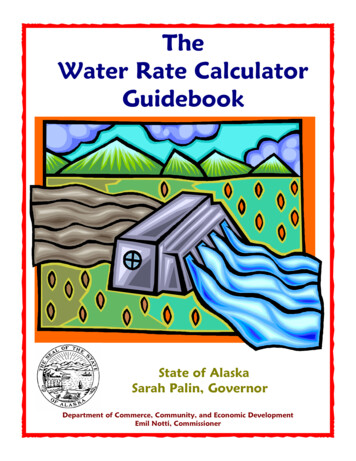
Transcription
McNair Scholars ProgramHandbookSouthern Illinois University CarbondaleRevised June 2014
SIU McNair Scholars Program CreedThe McNair Scholars Program is for high-achieving,who want to prepare for and excel in graduate school.Scholars take their academic work seriously, workmotivated studentshard to maintain goodgrades, are interested in pursuing mentored research opportunities in their fieldof study, and have the long-termgoal of pursuing a doctoral degree.McNair Scholars are expected to represent the ideals of academicexcellence by achieving to the best of their abilities and engaging in enrichingacademic and professional experiences throughout their undergraduate careers.2
McNair Scholars Program GuidebookMcNair Scholars Program Guidebook . 3General Information . 5Program Description . 5Program Objectives . 5History of the Federal TRIO Programs . 6McNair Staff Information. 9Who to See For Assistance . 10Program Components . 11Welcome Ceremony . 11McNair Courses . 11Undergraduate Research Professional Development Seminar – Univ 301a . 11Graduate School Preparation Seminar – Univ 401a. 11Summer Research Institute (SRI) . 12Goals . 12Overview of the SRI. 12Mentor Selection . 12Outside Work or Classes . 12Attendance . 12Orientation Sessions . 12Workspace and Schedule. 13Conducting Research . 13GRE PREP sessions . 14Stipends and Research Supplies . 14Academic Credit . 14Research Proposal Guidelines . 15Research Proposal Cover Sheet . 17Additional Program Services . 18Graduate Record Examination (GRE) Preparation . 18Individualized Tutoring . 18Academic Counseling and Advising . 18Scholars Study Room . 18SIU McNair Scholars Journal . 18Professional Development . 193
Travel Policy . 19Travel Request Form . 22Conferences and Graduate School Visitations . 23McNair Scholars Research Symposium . 23Discipline-specific Conferences . 23Graduate School Expositions . 23Graduate School Visitations . 23Graduate School Preparation . 24McNair Benefits . 24McNair Fee Waivers. 24McNair Fellowships . 24Expectations and Responsibilities . 25Attendance Policy . 26Assignment Policy. 26Grade Point Average Policy. 26Initial Assessments. 26Stipend . 26Email Communication . 27Additional Opportunities . 27Illinois Louis Stokes Alliance for Minority Participation (ILSAMP) Program . 27Students Promoting Educational Advancement and Research (SPEAR) . 27Undergraduate Research/Creative Activity Awards. 27Undergraduate Research Forum . 27Additional Responsibilities . 28Mentoring Responsibilities . 28Alumni Responsibilities . 28Plagiarism. 28McNair Mentor Information . 29Program Background . 29Program Activities . 29Faculty Mentor Roles and Responsibilities . 30Benefits. 314
General InformationProgram DescriptionThe Ronald E. McNair Post-Baccalaureate Achievement Program is a comprehensive programstructured to prepare undergraduates for successful careers as graduate students, professors, andprofessional researchers. The program is an educational opportunity program funded under theHigher Education Act of 1965 collectively known as TRIO Programs. The McNair Scholars Program isfunded by the U.S. Department of Education. The program awards grants to institutions of higherlearning for projects designed to provide low-income/first-generation college students or studentswho are members of a group that is underrepresented in graduate education with effectivepreparation for doctoral study.At Southern Illinois University Carbondale, the McNair Scholars Program accommodates at leasttwenty-eight students each year. All students participate in academic year and summer activitiesuntil they graduate. McNair Scholars are motivated students who have both the desire and thepotential to earn a doctorate degree. By participating in the program, Scholars increase and refinetheir academic skills and learn the tools necessary to be successful in graduate school.Program ObjectivesMission: The SIU McNair Scholars Program provides an enriching educational experience for lowincome/first-generation college students or students who are members of a group which isunderrepresented in graduate education, to excel as undergraduates, succeed in graduateschool, and ultimately enter faculty positions in our nations’ colleges and universities.RESEARCH OR SCHOLARLY ACTIVITIES85% of McNair Participants will complete research and scholarly activities that will directly impacttheir educational progression each McNair Program academic year.GRADUATE SCHOOL ENROLLMENT40% of McNair Program bachelor’s degree recipients (or equivalent) will be accepted and enrolled ina post-baccalaureate program of study by the fall term of the academic year immediately following thecompletion of the bachelor’s degree (or equivalent).Continued Enrollment in Graduate Study80% of first year graduate students will continue to be enrolled in graduate school at the beginning ofthe fall term of the next academic year.Doctoral Degree Attainment10% of McNair program participants served who will attain a doctoral degree within ten (10) years ofthe attainment of the bachelor’s degree.5
History of the Federal TRIO ProgramsThe history of TRIO is progressive. It began with Upward Bound, which emerged out of theEconomic Opportunity Act of 1964 in response to the administration's War on Poverty. In 1965,Talent Search, the second outreach program, was created as part of the Higher Education Act. In1968, Student Support Services, which was originally known as Special Services for DisadvantagedStudents, was authorized by the Higher Education Amendments and became the third in a series ofeducational opportunity programs.By the late 1960's, the term "TRIO" was coined to describe these federal programs. Over the years,the TRIO Programs have been expanded and improved to provide a wider range of services and toreach more students who need assistance. The Higher Education Amendments of 1972 added thefourth program to the TRIO group by authorizing the Educational Opportunity Centers. The 1976Education Amendments authorized the Training Program for Federal TRIO Programs, initially knownas the Training Program for Special Programs Staff and Leadership Personnel. Amendments in 1986added the sixth program, the Ronald E. McNair Post-baccalaureate Achievement Program.Additionally, in 1990, the Department created the Upward Bound Math/Science program to addressthe need for specific instruction in the fields of math and science. The Upward Bound Math/Scienceprogram is administered under the same regulations as the regular Upward Bound program, but itmust be applied for separately.The Higher Education Amendments of 1998 authorized the TRIO Dissemination Partnership programto encourage the replication of successful practices of TRIO programs. Finally, the OmnibusConsolidated Appropriations Act of 2001 amended the Student Support Services (SSS) program topermit the use of program funds for direct financial assistance (Grant Aid) for current SSSparticipants who are receiving Federal Pell Grants. The legislative requirements for all Federal TRIOPrograms can be found in the Higher Education Act of 1965, Title IV, Part A, Subpart 2. Therequirements for the SSS Grant Aid can be found in Public Law 106- 554. Currently the TRIOprograms include eight outreach and support programs targeted to help students progress frommiddle school to post baccalaureate programs.TRIO Programs Educational Opportunity Centers Ronald E. McNair Post-baccalaureate Achievement Program Student Support Services Talent Search TRIO Dissemination Partnership Program Training Program for Federal TRIO Programs Staff Upward Bound Upward Bound Math/Science* Adapted from “History of the Federal TRIO /triohistory.html6
Dr. Ronald E. McNairDr. McNair was born on October 21, 1950, in Lake City,South Carolina. He graduated from Carver High School,Lake City, South Carolina, in 1967, and received aBachelor of Science degree in physics from NorthCarolina A&T State University in 1971. By 1976 at theage of 26, he earned Doctor of Philosophy in physicsfrom Massachusetts Institute of Technology. He waslater also presented an honorary doctorate of Laws fromNorth Carolina A & T State University in 1978, anhonorary doctorate of Science from Morris College in1980, and an honorary doctorate of science from theUniversity of South Carolina in 1984.Ronald Mc Nair was an active member in many scienceorganizations. He was a member of the AmericanAssociation for the Advancement of Science, theAmerican Optical Society, the American Physical Society(APS), the APS Committee on Minorities in Physics, theNorth Carolina School of Science and MathematicsBoard of Trustees, the MIT Corporation VisitingCommittee, Omega Psi Phi, and a visiting lecturer inPhysics at Texas Southern University."Before you can make a dream cometrue, you must first have one.”- Dr. Ronald E. McNairThroughout his life, Dr. McNair was recognized as a leader not only academically, but also in his fieldof laser physics. He was frequently commended for his scientific achievements. Ron McNair graduatedmagna cum laude from North Carolina A & T (1971), and was named a Presidential Scholar (19671971), a Ford Foundation Fellow (1971-1974), a National Fellowship Fund Fellow (1974-1975), and aNATO Fellow (1975). He was awarded Omega Psi Phi Scholar of the Year Award (1975), Los"Whetheror not youreachyour goalsAngeles Public School System’s Service Commendation sentirelyonhowwellNational Society of Black Professional Engineers Distinguished National Scientist Award (1979), andyouWhopreparefor themhow badlythe Friend of Freedom Award (1981). He is listed in the Who’sAmongBlackandAmericans(1980),you want them. You're eagles! Stretchearned an AAU Karate Gold Medal (1976), and won five Regional Blackbelt Karate Championships.your wings and fly to the sky."Following graduation from MIT in 1976, he became a staff physicist with Hughes ResearchLaboratories in Malibu, California. His assignments included the development of lasers for isotopeseparation and photochemistry utilizing non-linear interactions in low-temperature liquids and opticalpumping techniques. He also conducted research on electro-optic laser modulation for satellite-tosatellite space communications, the construction of ultra-fast infrared detectors, ultravioletatmospheric remote sensing, and the scientific foundations of the martial arts. Dr. McNair wasselected as an astronaut candidate by NASA in January 1978. He completed a 1-year training andevaluation period in August 1979, qualifying him for assignment as a mission specialist astronaut onSpace Shuttle flight crews.Astronaut McNair first flew as a mission specialist on STS 41-B which launched from Kennedy SpaceCenter, Florida, on February 3, 1984. The crew included spacecraft commander, Mr. Vance Brand,the pilot, Commander Robert L. Gibson, and fellow mission specialists, Captain Bruce McCandless II,7
and Lt. Col. Robert L. Stewart. This mission marked the first flight of the Manned Maneuvering Unitand the first use of the Canadian arm (operated by McNair) to position EVA crewman aroundChallenger’s payload bay. Included were the German SPAS-01 Satellite, acoustic levitation and chemicalseparation experiments, the Cinema 360 motion picture filming, five Getaway Specials, and numerousmid-deck experiments -- all of which Dr. McNair assumed primary responsibility. This Challenger flightculminated in the first landing on the runway at Kennedy Space Center on February 11, 1984. Withthe completion of this flight, McNair had logged a total of 191 hours in space.Dr. McNair was assigned as a mission specialist on STS 51-L. Dr. McNair died on January 28, 1986when the Space Shuttle Challenger exploded after launch from the Kennedy Space Center, Florida.This disaster also took the lives of the spacecraft commander, Mr. F.R. Scobee, the pilot, CommanderM.J. Smith (USN), mission specialists, Lieutenant Colonel E.S. Onizuka (USAF), and Dr. J.A. Resnik,and two civilian payload specialists, Mr. G.B. Jarvis and Mrs. S. C. McAuliffe. Posthumously, he wasawarded the Congressional Space Medal of Honor.Dr. Ronald Erwin McNair, Physicist & Astronaut, dared to dream. As an African-American growing upin a poor community in the South, he encountered discrimination early in his youth. Yet, despite suchobstacles, he was not deterred from pursuing his dream of becoming a scientist. Dr. McNair enjoyedlife to the fullest. He was a 5th degree black belt Karate instructor and a performing jazz saxophonist.He also enjoyed running, boxing, football, playing cards, and cooking. After his death, Congressprovided funding for the Ronald E. McNair Post-Baccalaureate Achievement Program to encouragecollege students with similar backgrounds to Dr. McNair to enroll in graduate studies. Thus, theprogram targets students of color and low-income, first-generation college students. This program isdedicated to the high standards of achievement inspired by Dr. McNair's life (original source materialfrom http://www.nasa.gov, 2003).8
McNair Staff InformationThe McNair Scholars Program offer an array of services designed to assist our Scholars in acquiringthe skills and tools necessary to become successful graduate students. The staff of McNair iscomposed of a Director (who reports to the Associate Vice Chancellor for Research and ORDADirector), Associate Director, Program Assistant, and Graduate Advisor.AdministrativeKaren RenzagliaDirectorWoody Hall, Room B145Brenzaglia.plant@cos.siu.edu618.453.3229Rhetta SeymourAssociate DirectorWoody Hall, Room B145Arseymour@siu.edu618.453.4585All McNair staff can be reached at the following address:McNair Scholars ProgramSouthern Illinois UniversityMail Code 4719900 S. Normal AvenueCarbondale, IL 62901www.mcnair.SIU.eduFax: 618 453-45969Stephanie MayberryGraduate AssistantWoody Hall B139618.453.4581
Who to See For AssistanceThe McNair staff is always eager to assist Scholars or Mentors with any questions or concerns. Toexpedite the process of getting the assistance quickly, refer to the chart below for informationregarding the most appropriate staff member to contact.McNair Staff MemberKaren RenzagliaDirectorRhetta SeymourAssociate DirectorGraduate AdvisorsAreas of ExpertiseAcademic advisingGeneral program services and benefitsGrant oversight and reportsInterface with faculty and administratorsLocate resources and interact with funding agenciesMentor OrientationProgram mission and designProgram and policy implementationRecruitment and outreachSummer Research InstituteAcademic advising/tutoringRecruitment and application processCultural EventsGrant oversight and reportsInterface with faculty and administratorsLocate resources and interact with funding agenciesMentor OrientationProgram mission and designProgram and policy implementationQuestions about stipends and travelSummer Research InstituteUniversity programs and services integrationCollege site visits, Graduate Fairs, & ConferencesFirst year Scholar workshopsEvent Planning & CoordinationMcNair JournalMcNair NewsletterMentor selectionSummer timesheetsUpdates McNair and SIU calendarUNIV301b, 401a & bMailbox, business cardsOffice suppliesEvent Planning & CoordinationDocument ArchivingScholar Contact InformationEvent Planning & CoordinationCertification of McNair Scholars participation - fee waiver formRecruitment and outreachSPEAR RSOUndergraduate Research Forum – Poster supportUNIV 301 A Course10
Program ComponentsWelcome CeremonyAll new McNair Scholars will be announced at our annual Welcome Ceremony. The location andtime will be announced at a later date. Family and friends are encouraged to attend. Please dress inprofessional attire (no jeans, shorts, sweats, flip flops, etc.) as we want all Scholars to look their best.If a Scholar has already officially designated a mentor, the mentor will be invited to attend theceremony as well. All new Scholars and mentors will be introduced and asked to provide a briefoverview of their intended research project. If a research mentor has not been selected, the Scholarwill only be asked to say a few words about his/her academic area of interest and a potential researchproject. A photographer will be on hand to document the event.McNair CoursesThese required one credit hour courses will prepare all McNair Scholars for graduate school bydeveloping academic and research skills critical to success at the graduate level. Each course isdesigned to provide information and experiences vital to understanding the research process,acquiring a sense of academic professionalism, and managing the graduate school application process.There are two mandatory fall courses that all McNair Scholar must attend: Undergraduate ResearchProfessional Development Seminar – Univ 301a and Graduate School Preparation Seminar – Univ401a. These are described below.Undergraduate Research Professional Development Seminar – Univ 301aWe will explore the value and process of engaging in research and other related professionalactivities. We will also examine graduate school experiences.Course Objectives: Enhance academic skills (writing and technical reading) that best prepareundergraduates for success in graduate school. Prepare for and write a research project proposal. Identify a faculty mentor. Compile application packet for Undergraduate Research and Creative ActivityAward.Graduate School Preparation Seminar – Univ 401aWe will provide an overview of the credentials necessary for acceptance into graduate schooland establish a clear understanding of how to prepare for and succeed as a graduate student.Scholars will be given guidance on the selection of an appropriate graduate program and indevelopment of a competitive application packet. We will explore the value and process ofengaging in research and other professional activities and we will examine graduate school andfaculty experiences.Course Objectives: Enhance academic skills (writing and technical reading) that best prepareundergraduates for success in graduate school. Prepare for and take the GRE. Identify graduate schools and develop a timeline for application.11
Compile application packets for graduate school, including writing a personalstatement.Understand graduate school and faculty responsibilities.Summer Research Institute (SRI)The Summer Research Institute is a vital component of the SIU McNair Scholars Program. TheInstitute promotes actual research activities that are instrumental in preparing undergraduatestudents for successful entry into graduate programs.GoalsThe goal of the summer research project is to provide McNair Scholars with experience in allaspects of the research process including the following: conceptualizing a problem preparing a proposal conducting a literature review designing a research project gathering data analyzing data drawing conclusions based on empirical evidence reporting resultsScholars will develop not only critical research skills, but will also improve their communication skillsthrough the presentation of their research results in both written and oral forms.Overview of the SRIMentor SelectionDuring the spring semester prior to the Summer Research Institute, McNair staff and GraduateAdvisors will work with each Scholar to identify a research mentor (if one isn’t identified prior to theSRI). This will require a serious effort on the Scholar’s part to explore the interests of the faculty inhis/her department.Outside Work or ClassesDue to the demand and rigors of each research project, Scholars are not allowed to take classes orto work outside of the McNair program for the duration of the eight weeks.AttendanceAll Scholars conducting research during the summer are required to participate in all aspects of theorientation program (unless otherwise excused by the McNair Director or Coordinator).Orientation SessionsOrientation will be held on campus (location and times TBA). McNair staff, SIU faculty and specialguests will lead the workshops designed to assist Scholars in developing life skills (e.g., team building,time management, etc.) and to prepare for the professional and research experiences of the program.Scholars will be provided a detailed orientation schedule during the first meeting.12
During the one-week orientation program, Scholars receive instruction and guidance on the researchprocess. After the first week, Scholars will work independently for the remainder of the SRI.Arrangements should be made to work with your mentor to finalize the proposal by the due dateindicated on your schedule. This formal proposal will guide the research project (see ResearchProposal Guidelines for details) for the remainder of the summer.*Note: Failure to attend the first day of orientation will result in immediate termination from the program.Workspace and ScheduleSince each Scholar represents a different college/department, there will be many variations among theresearch projects.
North Carolina A & T State University in 1978, an honorary doctorate of Science from Morris College in 1980, and an honorary doctorate of science from the University of South Carolina in 1984. Ronald Mc Nair was an active member in many science organizations. He was a member of the American Association for the Advancement of Science, the
